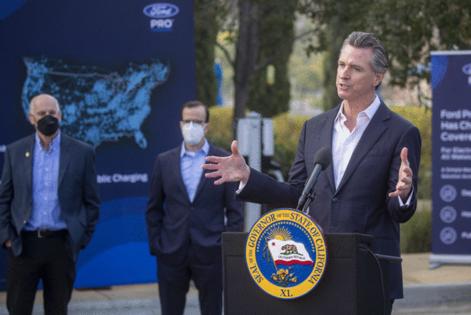US Supreme Court will decide if oil industry may sue to block California's zero-emissions goal
Published in Political News
WASHINGTON — The Supreme Court opened the door Friday for a potential challenge to California's long-standing authority to set stricter emissions limits for new vehicles, including its "zero emissions" goal for 2035.
The justices voted to hear an appeal from oil and bio-fuel producers who sued the Environmental Protection Agency, arguing it had given California too much authority to regulate motor vehicles in the name of combating climate change.
The suit was tossed out on the grounds that the oil producers had no standing. Their only claim of an injury was that they may sell less oil and gas in the future. But the justices voted to reconsider the standing issue and to decide whether the suit may proceed.
At issue ultimately is California's long-standing authority to set stricter emissions limits for new cars, trucks and buses.
The court will consider the case — Diamond Alternative Energy vs. EPA — early next year after Donald Trump has been sworn in.
His administration will decide whether California may enforce strict regulations over the next decade. The state would need Trump's EPA to issue a new waiver in 2025 that would allow California to go beyond the federal standards for tailpipe emissions.
The California waiver has a long history in environmental law.
Since the late 1960s, Congress has said states must follow the federal standards for auto emissions, but it also said California may be granted a waiver to go further. Under this provision of the Clean Air Act, the EPA may allow California to impose its own stricter emissions standards because of the state's worst-in-the-nation air pollution.
The law says that because California has a compelling and unique problem with air pollution, it can set stricter standards. But the attorneys for the oil industry argued that greenhouse gases are a global problem, not a California problem.
"EPA granted preemption waivers for California to tackle local problems like smog in the Los Angeles basin, where the pollution was both generated by and felt by Californians," the fuel producers said in their appeal. "But all sensibility stopped in 2009, when California began claiming that (the waivers) authorized it to set standards to curb greenhouse gases in an effort to tackle global climate change."
The law says a waiver could be granted to "meet compelling and extraordinary conditions," but the oil producers argued the "global climate is not the kind of California-specific condition" that justifies a special rule for the state.
"Under EPA's view, California alone among the states can regulate the nation's automobile market in the service of addressing climate change and forcing a transition to electric vehicles," the fuel producers said.
The appeal was written by Jeffrey Wall, the acting solicitor general in the final year of the first Trump administration, and Morgan Ratner, a former law clerk for Chief Justice John G. Roberts Jr. and Justice Brett M. Kavanaugh.
Their arguments fell flat in the lower courts. In April, the D.C. Circuit Court dismissed their claim in a 3-0 decision and said the fuel producers had no standing to sue the EPA simply because they might sell less fuel in California in the future.
The auto makers did not sue to challenge California's standards. Instead, Honda, Ford, Volvo, BMW and other major car makers "entered into independent agreements with California" to meet the emissions standards, EPA told the court.
In a separate appeal, Ohio and 16 other Republican-led states had claimed the special waiver for California is unconstitutional. They cited a 2013 opinion written by Roberts that struck down part of the Voting Rights Act on the grounds that its stricter scrutiny for Alabama and other states with a history of discrimination violated the state's right to "equal sovereignty."
But the court took action on that appeal.
In defense of its emissions rule, California officials said the tailpipe standards are needed both to combat unhealthy air pollution and to restrict greenhouses gases that are changing the climate. The California Air Resources Board said the "transportation sector is responsible for more than half of all of California's carbon pollution, 80% of smog-forming pollution and 95% of toxic diesel emissions."
The EPA agreed. It said California has unhealthy air pollution, and it "is particularly impacted by climate change, including increasing risks from record-setting fires, heat waves, storm surges, sea-level rise, water supply shortages and extreme heat."
_____
©2024 Los Angeles Times. Visit latimes.com. Distributed by Tribune Content Agency, LLC.




























































Comments